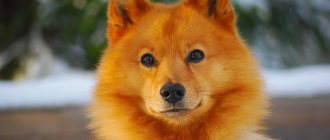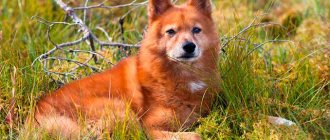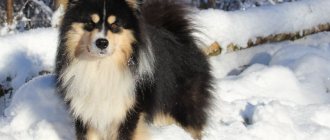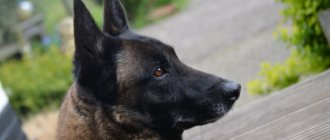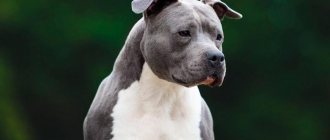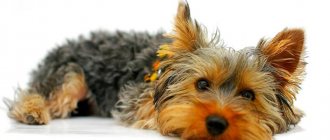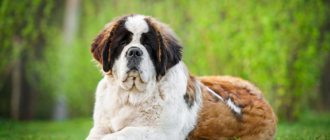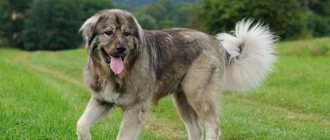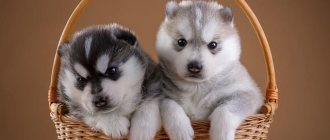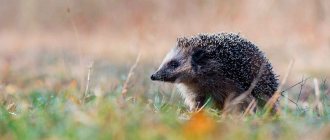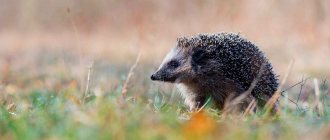The Karelian-Finnish Laika, also called Karelka or Karelian Laika, Finnish Spitz, is considered the smallest among all Laikas. Representatives of the breed will become indispensable companions for owners who love hunting, fishing, sports, traveling and any other types of physical activity.
Let's figure out whether the Karelian Laika is suitable for living in the city.
Story
The variety of Karelian-Finnish husky appeared thanks to four breeds: Karelian, Olonets, and Finnish bird husky. The combination of genotypes led to the appearance of a small dog with an excellent character, but an unstable exterior. Therefore, the individual was crossed with a Spitz, hence the double name of the species.
According to the principles of the International Association of Cynologists, the breed is named after its country of origin, Finland.
In 1984, the question of combining breeds in the name was raised. But the Laika Owners Union decided to assign the definition - “Finnish Spitz”. However, fans call the pets Karelian-Finnish huskies.
Breed characteristics
The characteristics of the Karelian Laika (Karelo) breed will be as follows:
- Aggression and anger are at a low level. The animal hardly shows them.
- High activity, dogs need to move a lot.
- In height, an adult reaches 46-50 cm.
- The shedding is strong.
- Health is average, there are genetic diseases.
- High intelligence.
- Well amenable to training.
- Doesn't like to be alone.
- It performs well as a guard and hunter.
Description
The description of an unusual breed should begin with its appearance. Low-low has a small size, a cute muzzle, expressive eyes, a square body, and a curled tail. The breed differs from other huskies in its rich honey-colored coat. The weight of males does not exceed 15 kg, females are 3 kg less, but this is not the only difference between them. Cables have an inclined stance, bitches have a flat back and a stretched stance.
Standard description of the Karelian-Finnish Laika:
- A wedge-shaped, triangular head with a wide occipital part.
- The forehead is longer than the muzzle, the latter ending in a rounded jaw. The brow ridges are clearly visible.
- The lips are not thick, pressed tightly.
- The nose is small.
- Oval eyes. The inner corners are lowered closer to the bridge of the nose. The eyelids fit tightly, protecting the whites and conjunctiva. Eye color ranges from hazel to dark brown.
- The ears are erect, resemble small triangles, and are proportional to the head. Their edges are pointed, the cartilage is elastic, but thick.
- The body is compact in size, close to a square in shape.
- The neck is strong and long.
- The back is straight with developed and raised withers. The transition to the lower back is smooth.
- The limbs are parallel to each other with strong joints and lean muscle tissue. The hind legs are wider than the front ones.
According to the established standard, a dog's middle fingers are longer than the rest. The breed's tail is in the form of a twisted ring, the tip is located on the back, sometimes pressed against the thigh or lying on its side.
Character and appearance
The dog is in a cheerful mood most of the time and prefers games. The Karelka subtly quickly grasps the mood of the owner and reacts sharply to a rise in tone. Even a short separation from the owner is difficult for her to bear. He reacts to manifestations of rudeness with stubbornness and disobedience.
Expert opinion
Anna Abramenko
An avid dog lover. Experience in veterinary medicine since 2009.
Ask a Question
With proper training, the dog is able to get along with other animals, although sometimes it shows signs of jealousy. He rarely shows aggression towards strangers, but behaves warily. In case of danger, it attracts attention with a long bark.
The Finnish red Spitz differs from other breeds in its stable nervous system, increased attentiveness, intellectual abilities, and memory. In the USA and England, dogs are used as companions for single people, as they have an easy-going nature and loyalty.
Laika Karelka feels great in any climatic conditions. Its dense undercoat has thermal insulating properties. The spine is elastic and hard. The fur is divided into zones along its length; large hairs are located on the withers, neck, and tail. Sideburns form in the cheek area. The muzzle and front of the paws are covered with short hair.
This is interesting: All about West Siberian huskies
The Karelka is easily recognized by its honey color. The contrast and presence of markings depend on the body part:
- the back of the paws, belly, chin are lighter than the main color;
- the tip of the tail and back with dark patches;
- white marks are present on the chin, belly and chest.
Dogs that do not meet these requirements are subject to culling. Therefore, before purchasing a Karelian-Finnish Laika, it is recommended that you familiarize yourself with the standards of this breed.
What to feed?
The red husky is not picky about food. Her optimal diet consists of foods such as:
- lean meat, cut into small pieces, which can occasionally be replaced with sausage and sausages that do not contain pork;
- raw bones - large, with meat remains, but without sharp edges;
- offal. In their raw form they can be ordinary food, and in their dry form they can be used as a delicacy;
- porridges made from buckwheat, millet and rice, which can be prepared either with lean broth or with the addition of a small amount of vegetable oil;
- fermented milk products, including cottage cheese;
- fresh, boiled and dry vegetables and fruits;
- rye bread crackers.
You should not give your dog:
- tubular bones;
- fresh milk;
- butter;
- sweets.
As for dry food, breeders' opinions are divided. On the one hand, it is better to feed a hunting dog natural food, but on the other hand, special food has a complete and balanced composition, and also saves time. Experts believe that both options are acceptable, the main thing is to stick to only one of them. A mixed feeding regimen can lead to serious digestive disorders, since natural foods and prepared foods are digested differently.
Behavior and skills
Living indoors tires the baby, so you need to regularly take him for walks in the fresh air and go out of town. Despite its size, the Karelian is a brave, courageous and devoted animal. And like all breeds, it does not recognize rudeness and cruelty towards itself from the owner. He is not jealous of children, cares and loves all family members, including other relatives. But you need to monitor the child’s behavior. With proper training, the Karelian guard husky can be an excellent hunter.
Features of hunting with a dog
It is necessary to reveal the hunting instincts in such a dog from an early age; for this, the Karelian is introduced to the smell of bird feathers and animal skins. The young individual is accustomed to loud sounds reminiscent of a gunshot. Animal baiting begins at 4 months of age. Only a trained pet is allowed to hunt wild boar, badger or bear.
As motivation, the dog needs to be shown the carcasses of live or killed animals. High efficiency is shown by the interaction of a puppy with an experienced hunting dog . In the process of work, he should not bite the victim if there are no prerequisites for self-defense.
Training
If you got a husky for hunting, then you need to train the puppy from a young age, and from the age of 4 months you need to take it out hunting. These dogs are smart and easy to train. Teaching methods should be chosen soft and consistent. Brute force cannot be used. This will cause the dog to lose trust. Although training huskies is easy, a beginner will not always be able to do this task. A dog can show character if it does not consider you its owner.
Care and maintenance
Many breeders like the breed because of its modest size, because it can be kept in an apartment without any problems. Although the warm fur and dense undercoat allows the dog to feel comfortable on the street. Practice shows that a Karelian woman feels more comfortable in nature, where she has the opportunity to move freely and lead an active lifestyle, rather than in a warm place, but within four walls. But you can’t do without an insulated booth and an enclosure protected from the wind.
The puppy must be kept indoors only. Despite the voluminous coat, caring for this breed is not difficult. You can maintain a beautiful appearance through weekly brushing. During the molting period, this manipulation is carried out once a day. The dog needs to be bathed every 3-4 months; if the baby takes part in competitions, then more often.
Eyes, teeth, claws, ears do not require daily care, but they need to be examined periodically. This will prevent and quickly eliminate any inflammatory process, as well as other manifestations of dangerous diseases. The main aspect of keeping low-low is a balanced diet. The physical development, appearance and health of the animal directly depend on the diet.
The breed is not prone to allergic reactions, so the menu can include natural and industrial food. It should be taken into account that natural food must be supplemented with vitamins, which should be given to the dog according to the established dosage and system.
You can increase the color saturation of wool with various additives that contain seaweed.
Walking, physical activity
As already mentioned, you need to walk a Spitz a lot. What time exactly? You will have to spend 3.5 hours a day walking. It is recommended to divide your time into 2-3 walks during the day.
During the walk, the animal must be given plenty of frolic. It’s good if you can visit special dog parks or periodically get out into nature.
As for walking around the city and riding public transport, they must be carried out with a leash and muzzle. Otherwise, the owner may receive a fine for breaking the law.
Nutrition
Finnish Spitz can be fed natural or commercial food. But you cannot mix these two varieties in one serving. The regularity of food depends on the age of the pet:
- 1.5 months – 5-6 times a day;
- 3 years – 4;
- 5 years – 3;
- An adult feeds 2 times a day.
For the proper development of the body, it is necessary to feed your pet food rich in various microelements and vitamins. Food should be warm and not hot, water should be clean and fresh.
You cannot feed a Karelian woman from the master's table.
Prohibited products include:
- pork and any other fatty meat;
- spices;
- pasta;
- candies and chocolate;
- spicy foods;
- fried foods;
- tubular bones.
It is not advisable to give your dog river and raw fish, as it may be affected by helminths. You should not allow your pet to dig through garbage or eat with other animals, especially stray relatives.
Mating
Mating a Finnish Spitz is no different from breeding other breeds. Cables become fully mature by 1.5-2 years of age, in females by 18 months . Mating should occur on the 15-20th day of estrus. Before mating, you need to remember a few points:
- It is necessary to walk the animals together in a free area; if the act occurs during a walk, the dogs should not be disturbed;
- after this, the bitch is taken to the dog so that he can feel comfortable;
- During the process itself, pets need to be helped (held, placed, placed with pillows).
Before mating, it is imperative to make sure that both dogs are healthy, vaccinated and meet the standards. To resolve this, you can invite a specialist who will tell you how to properly help your pets.
Health and illness
Diseases that are often found in females:
- Obesity. If a dog lives in an apartment, then it feels a clear lack of active pastime. In this case, through physical activity, long walks, and games, this problem can be solved.
- Epilepsy.
- Allergy.
It is important to monitor your pet’s behavior; if its activity has decreased, there is no appetite, or there is discharge in the mucous membranes, then you should immediately contact a veterinarian.
Also, the pet owner should regularly use drugs against ectoparasites. The most effective remedies are prescribed by a specialist individually for each dog. Rules for their use:
- drops are applied to the withers once a month and the pet is not bathed for ten days;
- The tablets are given to the animal orally with a small amount of water, their effect lasts 3 months;
- The spray is used before going outside;
- A flea collar is only effective with constant use.
When a Karelian is in the forest, she can pick up ticks. These parasites are carriers of dangerous diseases, one of which is piroplasmosis, which without proper medical care can lead to death. The greatest activity occurs in late spring, summer and early autumn.
After visiting a park or forest, the dog must be examined for parasites. Most often they are attached to the ears, neck, abdomen, armpits, and head. The tick does not attach itself immediately, so careful inspection will help avoid infection. When an insect is detected, it is necessary to inspect the bite area. Using tweezers, pull it out in a circular motion. Then the affected area should be treated with alcohol or any antiseptic.
You need to observe the baby's behavior for several days. A passive state, lack of appetite, elevated temperature are signs of infection, in which case it is necessary to immediately show it to a veterinarian.
Advantages and disadvantages
Initially, Finno-Karelian huskies were bred for hunting, but later guard and sociable qualities were noticed in them.
| Advantages | Flaws |
| Such dogs have a stable psyche | Show stubbornness |
| Care and maintenance do not require special time or financial investments | The Spitz loves to eat, so it is necessary to properly formulate a diet, excluding fatty, sweet and spicy foods from the menu. Otherwise, the dog develops obesity, which is difficult to cope with. |
| The animal is resistant to diseases and can live 15 years if properly maintained. | It is necessary to train a dog from an early age, otherwise in the future it will be impossible to curb the Karelian’s fiery temperament |
| Suitable as a companion, hunting assistant, watchman | Prefers to dominate |
Rules for choosing puppies
When choosing a puppy, you need to pay attention to its working qualities, appearance and pedigree. Experts recommend buying five-month-old kittens that have already received all their vaccinations. In addition, during this period the dog acquires the appearance of an adult. You should also examine the parents of the future pet, ask the owner about their hunting qualities and awards, if any.
The sale of low-low from private breeders begins very early - from the age of two months, which is associated with the difficulties of caring for large offspring. Certified establishments issue a veterinary card with vaccination notes and a passport.
Signs of well-developed Karelian puppies:
- strong bones, muscularity, fatness;
- proportional relationship between all parts of the body;
- smooth, thick and fluffy coat without dandruff;
- clean eyes with no traces of discharge around them.
At 1.5 months, not all puppies have erect ears, but by palpation you can determine the presence of soft cartilages. In representatives of the purebred breed, they straighten by three months of life. According to the standard, there should be no fifth toe on the hind legs.
Preference should be given to inquisitive and active individuals who easily make contact and are not afraid of loud sounds. Bitches are calmer, more affectionate and sociable, so they are actively adopted by lonely people.
Reviews
Victoria: “At first I struggled with this little golden ball, because the puppy showed excessive curiosity, and as a result there were broken dishes in the house and overturned flowers. However, the dog reacts to the owner’s dissatisfaction and understands what is wrong. We train every day and plan to participate in competitions.”
Mikhail: “I’ve been hunting for many years, I always went alone or with friends. An acquaintance took a Karelian woman with him into the forest. At first I didn’t take this animal seriously; nevertheless, to bait a large animal, you need to have more impressive dimensions. But when the dog picked up the scent in a matter of seconds, followed all the commands and showed its hunting qualities, I gave up. I’m seriously thinking about buying a puppy.”
Tatyana: “The Karelo-Laika is a choice for those who want to buy not just a watchdog, but a friend. The pet is sensitive to mood changes. Three years ago I was given a little puppy. At first it was difficult to work with him. Now my Count annually replenishes the “success corner” with his new awards.”
Upbringing
Education begins at 5 months. Training is carried out strictly, but with due respect. It should be in the form of a game involving the senses of smell and hearing. An attempt to educate with “carrot and stick” will be a failure. It's better to start with general commands and gradually move on to more difficult tasks. Learning to play is not an easy task - the owner must have a persistent and patient character for this.
If you understand that you are not suitable for the training process, then it is better to seek the help of an experienced dog handler. A well-trained dog unquestioningly obeys its owner and copes well with its responsibilities as a watchman or hunter, as well as simply a loyal and reliable friend.
Photo and video review
It is impossible to determine the character and disposition of a Finnish Spitz from a photo, but you can evaluate the appearance of the breed. Video reviews and training videos allow you to clearly see the dog in action.
The Karelo-Finnish Laika has friendliness and hunting qualities. The breed is great for novice dog owners.
